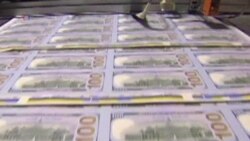The U.S. central bank says it will trim another $10 billion from its bond buying program, saying that despite weaker than expected job growth, the world’s largest economy is gaining strength. The announcement Wednesday means the Federal Reserve will buy $65 billion in securities next month, instead of the $75 billion it purchased in January. The program, called quantitative easing, is credited with stimulating the U.S. economy by making more money available to investors and keeping interest rates low. But, investors who have grown accustomed to the monetary stimulus are having a hard time letting go.
The Fed’s easy money policies get high marks from economists for rescuing the U.S. housing market and boosting stock prices. But now that the U.S. economy is picking up, the central bank say it’s time to scale back support.
While the announcement comes as no surprise, neither was the reaction on Wall Street, where major stock indices plunged more than 1 percent.
David Santschi at the market research firm TrimTabs spoke to VOA via Skype.
“No, the markets aren’t taking it well. A lot of that probably has to do with what’s going on in other places," said Santschi.
Santschi is referring to the slowdown in emerging markets, especially those with high interest yields like Turkey, where investors have begun pulling out in anticipation of lower risk and higher returns in the U.S. and other advanced economies.
“There’s a lot of money being created all around the world, not just by the Fed but by other central banks. And while central banks can create all the money they want, they can’t control where the money goes," he said.
The World Bank calls it a rebalancing of sorts. Bank economist Andrew Burns says the good news is that a pick-up in the world’s biggest economy is good news for the rest of the world.
“What’s happening in the United States is a much improved growth situation; that’s good for developing countries, but at the same time there’s going to be a tightening of monetary policy. But these things happen hand in hand. So it’s a tailwind coming from stronger growth in the United States and a bit of a headwind from tighter financial conditions," said Burns.
The Fed's two-day policy meeting, which concluded Wednesday, is officially the last for Ben Bernanke, who finishes an eight-year term as Fed chairman at the end of the month. Vice Chair Janet Yellen takes over the helm February 1.
The Fed’s easy money policies get high marks from economists for rescuing the U.S. housing market and boosting stock prices. But now that the U.S. economy is picking up, the central bank say it’s time to scale back support.
While the announcement comes as no surprise, neither was the reaction on Wall Street, where major stock indices plunged more than 1 percent.
David Santschi at the market research firm TrimTabs spoke to VOA via Skype.
“No, the markets aren’t taking it well. A lot of that probably has to do with what’s going on in other places," said Santschi.
Santschi is referring to the slowdown in emerging markets, especially those with high interest yields like Turkey, where investors have begun pulling out in anticipation of lower risk and higher returns in the U.S. and other advanced economies.
“There’s a lot of money being created all around the world, not just by the Fed but by other central banks. And while central banks can create all the money they want, they can’t control where the money goes," he said.
The World Bank calls it a rebalancing of sorts. Bank economist Andrew Burns says the good news is that a pick-up in the world’s biggest economy is good news for the rest of the world.
“What’s happening in the United States is a much improved growth situation; that’s good for developing countries, but at the same time there’s going to be a tightening of monetary policy. But these things happen hand in hand. So it’s a tailwind coming from stronger growth in the United States and a bit of a headwind from tighter financial conditions," said Burns.
The Fed's two-day policy meeting, which concluded Wednesday, is officially the last for Ben Bernanke, who finishes an eight-year term as Fed chairman at the end of the month. Vice Chair Janet Yellen takes over the helm February 1.












